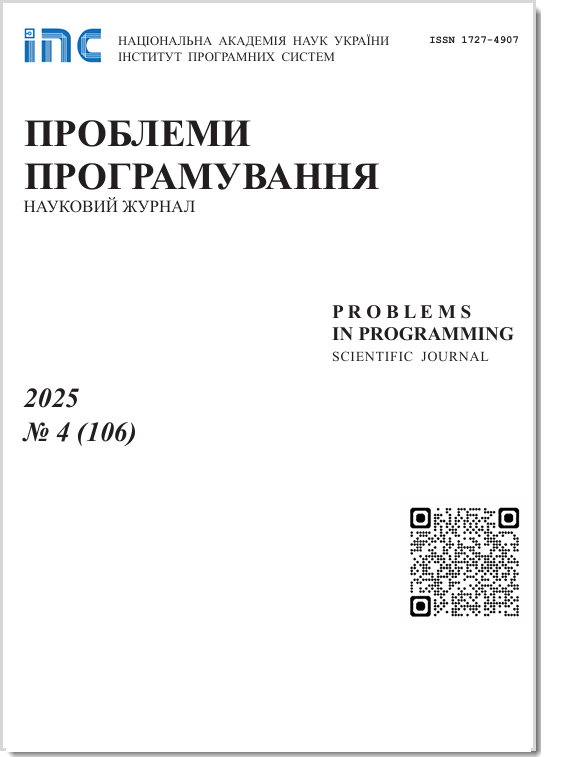Tools of investigation of time and functional efficiency of bionic algorithms for function optimization problems
Abstract
An instrumental environment for determining the time and functional efficiency of algorithms are developed. Abilities of studying the effectiveness of algorithms on a set of special "uncomfortable" functions, which can be changed and implemented are provided. Computer experiments are carried out, including the definition of theoretical foundations, preparation, implementation and analysis of the results. The dependency of the time and functional efficiency of the rouge algorithm on the number of parameters of functions whose global extremum is determined, and the parameters of the roaming algorithm: population size and number of epochs are obtained. In the developed environment, it is possible to study other bionic algorithms.
Problems in programming 2018; 2-3: 270-279
Keywords
Full Text:
PDF (Українська)References
Kennedy J., Eberhart R. Particle Swarm Optimization. In proceedings of IEEE International Conference on Neural Networks. 1995. P. 1942-1948.
Yang X.S., Deb S. Cuckoo search via Levy flights. In proceedings of World Congress of Nature & Biologically Inspired Computing. 2009. P. 210-214.
https://doi.org/10.1109/NABIC.2009.5393690
Yang X.S. A new metaheuristic bat-inspired algorithm. Nature Inspired Cooperative Strategies for Optimization. Springer. 2010. P. 65-74.
https://doi.org/10.1007/978-3-642-12538-6_6
Yang X.S. Firefly algorithms for multimodal optimization. In proceedings of the 5th Symposium on Stochastic Algorithms, Foundations and Applications. 2009. P. 169-178.
https://doi.org/10.1007/978-3-642-04944-6_14
Yang X.S., Chen J. Algorithm of Marriage in Honey Bees Optimization Based on the Wolf Pack Search. In proceedings of the International Conference of Intelligent Pervasive Computing. 2007. P. 462-467
https://doi.org/10.1109/IPC.2007.104
Kennedy J., Eberhart R.C. A discrete binary version of the particle swarm algorithm. In proceedings of the International Conference on Computational Cybernetics and Simulation. 1997. P. 4104-4108.
Shi Y.R., Eberhart C. Parameter selection in particle swarm optimization. In proceedings of Evolutionary Programming VII (EP98). 1998. P. 591-600.
https://doi.org/10.1007/BFb0040810
Kennedy J. Small worlds and mega-minds: effects of neighborhood topology on particle swarm performance. In proceedings of IEEE Congress on Evolutionary Computation (CEC 1999). 1999. P. 1931-1938.
Moore J., Chapman R. Application of particle swarm to multiobjective optimization. Department of Computer Science and Software Engineering. Auburn University. 1999. 840 p.
Shynkarenko V. I. (2006). Functional effectiveness of algorithms with fuzzy specification. Problems in programming, (1), 24-33
Shynkarenko V. I. (2001). Features of an estimation of efficiency of computational algorithms. Problems in programming, (1-2), 23-29.
Molga, M., & Smutnicki, C. (2005). Test functions for optimization needs. Test functions for optimization needs, 101.
Zeitlin, H. E. (1998). Introduction to algorithmics. K.: Sphera, 310.
Mendes, R., Kennedy, J., & Neves, J. (2004). The fully informed particle swarm: simpler, maybe better. IEEE transactions on evolutionary computation, 8(3), 204-210.
https://doi.org/10.1109/TEVC.2004.826074
DOI: https://doi.org/10.15407/pp2018.02.270
Refbacks
- There are currently no refbacks.









